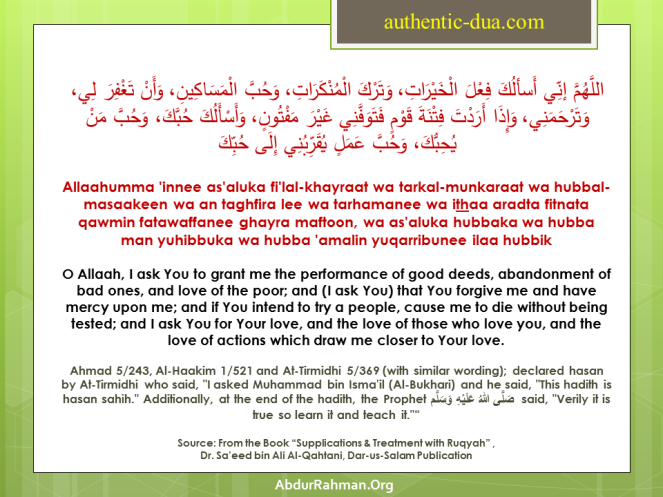رَبِّ هَبْ لِي حُكْمًا وَأَلْحِقْنِي بِالصَّالِحِينَ
My Lord! Bestow Hukm on me, and join me with the righteous
وَاجْعَل لِّي لِسَانَ صِدْقٍ فِي الْآخِرِينَ
And grant me an honorable mention in later generations
وَاجْعَلْنِي مِن وَرَثَةِ جَنَّةِ النَّعِيمِ
And make me one of the inheritors of the Paradise of Delight
[Surah Ash-Shu’araa 26:83-85]
—
Tafseer Ibn Kathir of above Verses:
Here Ibrahim, upon him be peace, asks his Lord to give him Hukm. Ibn `Abbas said, “This is knowledge.”
وَأَلْحِقْنِى بِالصَّـلِحِينَ
(and join me with the righteous.) means, `make me one of the righteous in this world and the Hereafter.’ This is like the words the Prophet said three times when he was dying:
«اللَّهُمَّ فِي الرَّفِيقِ الْأَعْلَى»
(O Allah, with the Exalted Companion (of Paradise)).
وَاجْعَل لِّى لِسَانَ صِدْقٍ فِى الاٌّخِرِينَ
(And grant me an honorable mention in later generations.) meaning, `cause me to be remembered in a good manner after my death, so that I will be spoken of and taken as a good example.’ This is like the Ayah,
وَتَرَكْنَا عَلَيْهِ فِى الاٌّخِرِينَ سَلَـمٌ عَلَى إِبْرَهِيمَ كَذَلِكَ نَجْزِى الْمُحْسِنِينَ
(And We justify for him (a goodly remembrance) among the later generations: “Salam (peace) be upon Ibrahim. Thus indeed do we reward the good doers.) (37:108-110)
وَاجْعَلْنِى مِن وَرَثَةِ جَنَّةِ النَّعِيمِ
(And make me one of the inheritors of the Paradise of Delight.) meaning, `bless me in this world with honorable mention after I am gone, and in the Hereafter by making me one of the inheritors of the Paradise of Delight.’
Arabic Morphology of the above du’a can be read @
http://corpus.quran.com/wordbyword.jsp?chapter=26&verse=83
Check other Qur’anic Du’aas :
https://authentic-dua.com/category/group/quranic-supplications/
Related Links:



You must be logged in to post a comment.